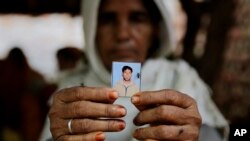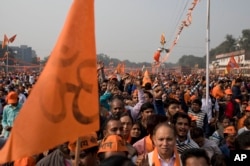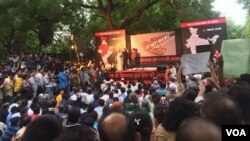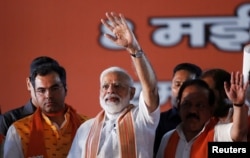The spike in violent attacks against India’s Muslim minority has raised concerns among rights groups, which are urging the government to take more decisive measures to protect the country’s minorities.
With an uptick in hate crimes against Muslims, India’s second-largest religious group, many rights activists are alarmed that intolerance toward minority groups is on the rise in the Hindu-majority country.
“There is growing insecurity and fear among minority groups in India, especially Muslims and Dalits,” said Jayshree Bajoria, a research consultant with Human Rights Watch (HRW).
“The government has failed to prevent or credibly investigate growing mob attacks on religious minorities or marginalized communities, often carried out by groups claiming to support the government,” she told VOA.
Analysts: BJP encourages violence
Analysts charge that the ruling Bharatiya Janata Party (BJP), a Hindu nationalist party, has encouraged this trend by publicly supporting attackers against minorities.
BJP leaders have often “made inflammatory speeches against minority communities and promoted Hindu supremacy and ultranationalism, which has encouraged further violence,” Bajoria said.
The U.N has expressed concern about the targeting of minorities in India and has warned Indian officials of the consequences of their “divisive policies.”
“We are receiving reports that indicate increasing harassment and targeting of minorities, in particular Muslims and people from historically disadvantaged and marginalized groups, such as Dalits and Adivasis,” Michelle Bachelet, the U.N. human rights chief, said in her annual report to the U.N. Human Rights Council in March.
Series of attacks
In recent months, rights groups have reported incidents of mob attacks, killings and sectarian violence against Indian Muslims.
In April, a 34-year-old Muslim man in Delhi’s Tihar jail was brutally beaten before a jail official reportedly engraved a Hindu sign on his back.
In March, a Hindu mob carrying wooden sticks and stones invaded a Muslim family’s house in New Delhi. The mob accused the family of playing cricket instead of celebrating Holi, a popular Hindu festival.
The family was reportedly told to “go to Pakistan” if they wished to play cricket.
Muslims, who make up about 14 percent of country’s population, say they have long been marginalized, targeted and discriminated against.
But recent violent attacks against Muslims have further raised fears among them, they say.
“I was born here and grew up on the roads in Delhi, and never felt as insecure as I feel now,” Tameez Ud Din, an alias used by a Muslim engineer from New Delhi, told VOA.
“The adoption of Hindutva ideology by the current government is to be blamed for the rise in attacks. We [Muslims] are killed in the name of cow protection and the attackers get political protection. I don’t feel safe anymore.” Ud Din said.
Cow vigilantism
Muslims frequently become victims of lynchings and other killings over transporting cattle, or allegedly selling, carrying, consuming or slaughtering cows, rights groups said.
Cows are viewed as sacred in Hinduism and it is illegal to sell or slaughter them in many Indian states.
A recent HRW report said “at least 44 people, including 36 Muslims,” were killed in cow-related violence from 2015 to 2018.
Last month, a video went viral on social media in which a 68-year-old Muslim man, Shaukat Ali, was seen surrounded by a Hindu mob who abused him, accused him of selling beef and later forced him to eat pork, which is strictly forbidden in Islam.
“Shaukat Ali was forced to eat pork. Those who were beating Ali knew that ... nobody will face any consequence” under the BJP government, Asaduddin Owaisi, a prominent Muslim politician from Telangana state, told reporters after the incident.
Hindu nationalism
Some analysts echo Owaisi’s concerns and blame the government for espousing a Hindu-leaning ideology, which has been responsible in fueling violence against Muslims.
Hindu nationalism, locally known as Hindutva, is driven by calls for racial and cultural superiority of Hindus in India.
“These vigilante groups doubtlessly feel that the authorities are on their side because there have been comments and actions, largely from elected BJP officials, aimed at showing Hindu nationalists that the government takes cow protection seriously. In some cases, BJP leaders have even publicly justified the attacks,” said Bajoria of HRW.
Members of Indian National Congress (INC), the opposition Indian political party, also blame the BJP government of embracing hatred-based politics.
“This increase in communal violence against Muslims is a result of BJP’s mentality,” said Pawan Khera, a spokesperson for INC.
“They have divided the country on the basis of religion,” he told VOA.
The Indian government, however, rejects these accusations.
“This is a bogie raised by our political rivals and groups which are inimical towards the BJP,” said G.V.L. Narasimha Rao, a BJP spokesperson.
“I would be happy to speak if you can offer any evidence-based analysis than flimsy and patchy motivated comments by some groups,” Rao told VOA.
Divisive?
Some experts charge that BJP’s alleged lack of action could translate to its support of these actions.
“This Hindu nationalism or state-sponsored anti-Muslim sentiment is a dangerous game that will divide the country,” Ashok Swain, an Indian-born professor of peace and conflict research at Uppsala University in Sweden, told VOA.
Indian Prime Minister Narendra “Modi has made it India vs. Pakistan, or Hindus vs. Muslims, or rest of India vs. Kashmiris,” he said.
Kamal Mitra Chenoy, a former professor at Jawaharlal Nehru University, holds a similar view.
“Modi’s right-hand man, Amit Shah, has termed Muslims as ‘termites’ for the country, and all the minorities are scared of this statement as they know there will be consequences,” Chenoy said.
Some analysts believe that BJP is only trying to win elections by appealing to its anti-Muslim base and is not at war with Muslims.
"Any party or Indian government cannot operate without Muslims. I think Modi will understand it, too. BJP’s behavior is because of the election season,” Rajeev Sharma, a New Delhi-based political analyst, told VOA.
The 2019 Indian general election is under way in India and a new government will most likely be announced by the end of the month.








